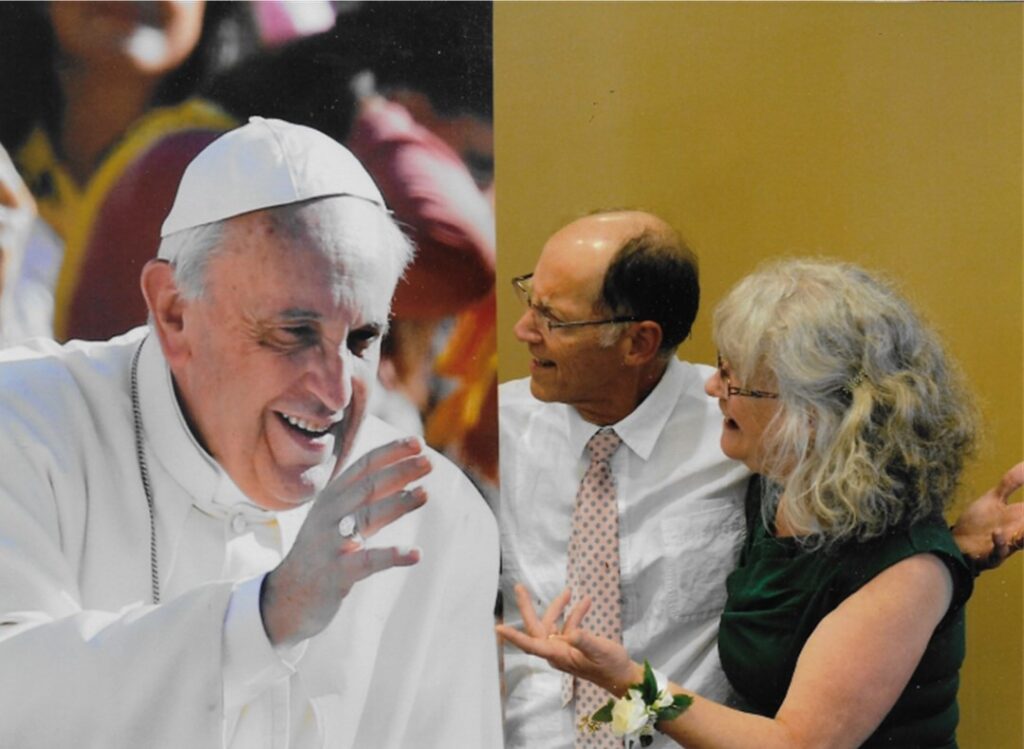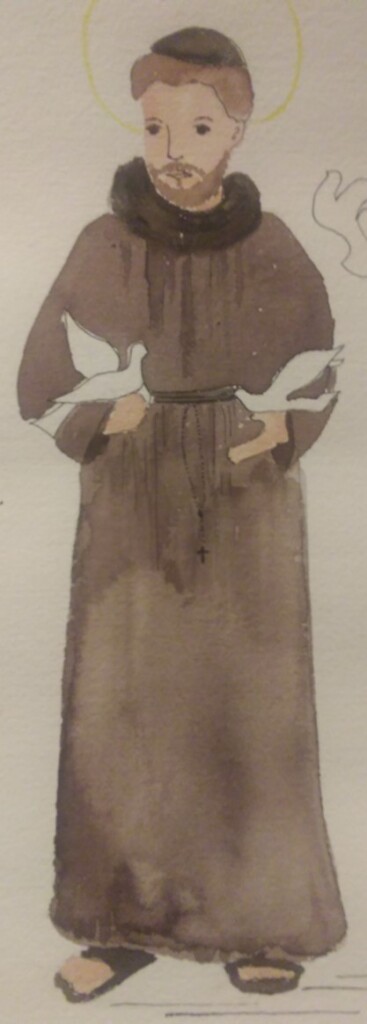Pope Francis: Changing Catholic Culture but not Catholic Doctrine
By Robert Fontana

Pope Francis has a pretty good approval rating among Catholics in the United States. According to Pew Research, 83% of Catholics in the US have a favorable opinion of the Argentine Pope. However, there is a very vocal minority which includes high-ranking clergy who are very unhappy with the current pope and do not mind saying so. Commentators for EWTN, The Catholic Register and First Things and prominent prelates have called his papacy “a catastrophe,” “leaderless,” and “a betrayal.”
Advocates for greater protection of children, youth, and vulnerable adults and whistleblowers in the current crisis of clergy sex abuse and coverup are extremely disappointed in Pope Francis (Lori and I include ourselves in that camp). He says the right words but these often do not turn into effective action. A case in point is the very bizarre and sick story of Father Marko Ivan Rupnik, a celebrated Jesuit preacher and artist whose mosaics grace churches and basilicas around the world. Close to a dozen women, including Catholic sisters, have come forth accusing Rupnik of sexual, psychological, and spiritual abuse. The allegations were deemed credible by Jesuit investigators; yet Rupnik, who had been removed from ministry, was allowed to return. The public outcry was so great that just recently Pope Francis was pressured to reopen his case. (See: https://www.seattletimes.com/nation-world/pope-orders-vatican-to-reopen-case-of-priest-accused-of-adult-abuse-but-allowed-to-keep-ministering/)
In light of all this criticism, I think it is important to keep in mind that Pope Francis has not changed one Catholic doctrinal teaching or moral teaching. He is working to change Catholic culture, how we understand ourselves as a Catholic people and how we express this self-understanding in worship and mission. In doing this he is being faithful to the intent of the reforms of the Second Vatican Council which sought to transition from a Church that saw itself as a European monarchy (Council of Trent and Vatican I) to a Church that sees itself as the People of God from all the nations, sinful and holy, traveling through history. This People of God, clergy and lay, has a mission to be the mercy of God in the world as disciples of Jesus.
The following vignettes are examples of how I see Pope Francis changing Catholic culture without changing Catholic doctrine:
The new pope was introduced as “Francis,” a name no other pope has dared to take: Pope Francis said, “Francis is also the man of peace. That is how the name came into my heart: Francis of Assisi. For me, he is the man of poverty, the man of peace, the man who loves and protects creation; these days we do not have a very good relationship with creation, do we?” …Francis of Assisi “gives us this spirit of peace, the poor man who wanted a poor church,” the pope said. “How I would love a church that is poor and for the poor.” (https://www.ncronline.org/blogs/francis-chronicles/pope-francis-i-would-love-church-poor )

Pope Francis on the Sacraments: The Catholic Church is a “field hospital,” where the Eucharist is understood as medicine for the sick instead of a prize for the perfect…” (http://www.icatholic.org/article/the-church-as-a-field-hospital-6836071)
Remember when he said to priests… [be] shepherds living with “the smell of the sheep”, shepherds in the midst of their flock…” (https://www.catholicworldreport.com/2013/03/28/full-text-pope-francis-chrism-mass-homily/) There is that spirit of clericalism in the Church, that we feel: clerics feel superior; clerics distance themselves from the people. Clerics always say: ‘this should be done like this, like this, like this, and you – go away!’” It happens “when the cleric doesn’t have time to listen to those who are suffering, the poor, the sick, the imprisoned: the evil of clericalism is a…is a new edition of this ancient evil [of the religious ‘authorities’ lording it over others].” But “the victim is the same: the poor and humble people, who await the Lord.” ~ (https://aleteia.org/2018/08/23/5-of-the-many-times-pope-francis-has-railed-against-clericalism/)
Francis’ first trip as pope: Pope Francis has said Mass for migrants on Italy’s tiny island of Lampedusa, condemning the “global indifference” to their plight…Lampedusa, about 80 miles (120km) from Tunisia, is one of the nearest gateways to Europe for Africans fleeing poverty and conflict. (https://www.bbc.com/news/world-europe-23224010)
Francis changing the College of Cardinals Pope Francis created 21 new cardinals (Sept 2023) from across the world… created from 15 different countries… The pope also created cardinals representing Catholic communities in non-majority Christian countries: … Jerusalem; …Hong Kong; … Malaysia. In total, 16% of all cardinal-electors are now from Asia, compared with 9% before Francis’ pontificate…The pope has now created cardinals from 66 different countries…In contrast to the increase in cardinals from the global South and East, the percentage of cardinals from Europe has fallen from 53% in 2013 to 39% today…(https://ww.catholicnewsagency.com/ news/255528/pope-creates-21-new-cardinals-continues-expansion-of-college-s-geographic-diversity)
What he spoke about homosexuals: Italian journalist Andrea Tornielli asked the pope how he might act as a confessor to a gay person in light of his now famous remarks in a press conference in 2013, when he asked: “Who am I to judge?” “On that occasion I said this: If a person is gay and seeks out the Lord and is willing, who am I to judge that person?” the pope says. “I was paraphrasing by heart the Catechism of the Catholic Church where it says that these people should be treated with delicacy and not be marginalized.”
“…”I prefer that homosexuals come to confession, that they stay close to the Lord, and that we pray all together,” says Francis. “You can advise them to pray, show goodwill, show them the way, and accompany them along it.” (https://www.ncronline.org/francis-explains-who-am-i-judge)
Francis and a “synodal church:” In a certain sense, what the Lord asks of us is already contained in the word “synod.” Walking together – Laity, Pastors, the Bishop of Rome – is an easy concept to put into words, but not so easy to put into practice…A synodal church is a listening church, knowing that listening “is more than feeling.” It is a mutual listening in which everyone has something to learn. Faithful people, the College of Bishops, the Bishop of Rome: we are one in listening to others; and all are listening to the Holy Spirit, the “Spirit of truth” (Jn 14:17)… (https://www.thetablet.co.uk/texts-speeches-homilies/4/849/pope-francis-address-at-commemorative-ceremony-for-the-50th-anniversary-of-the-synod-of-bishops-17-october-2015)
(Post your comments. You are welcome to agree or disagree.)